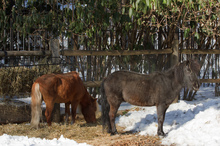Turning your old horse out to pasture is not the kindest thing to do during cold weather unless steps are taken to preserve the horse's health. Making sure that the horse is well-cared for and has adequate shelter available at all times is paramount in keeping it functioning and alert.

Effects of cold weather on older horses
Although time takes its toll on the older horse's bodily systems, much can be done to keep the horse healthy, spry, and capable of great companionship in spite of cold weather.<
Although time takes its toll on the older horse's bodily systems, much can be done to keep the horse healthy, spry, and capable of great companionship if owners stop and consider special needs of aging horses especially when cold weather threatens their health.
As a horse ages, the digestive tract becomes less efficient. Bones and joints are less resilient and an older horse may feel the aches and pains of arthritis. The immune system becomes less reliable, making older horses more susceptible to illness and less able to recuperate from disease or injury.
Parasites take a heavier toll and older horses are less able to cope with environmental stresses such as cold, wind, and damp conditions. Hormonal changes may affect the overall body condition, hair growth, energy level and appetite.
Aging horses are also more susceptible to respiratory, eye, and dental problems making it necessary to check on them more often than healthy, younger horses.
Some of these signs of decline may be directly related to the aging process, but they may also be an indication of an underlying medical problem. Having the horse checked regularly by a veterinarian and at the earliest signs of any problem is important for the maintenance of good health.
Dental care for your older horse
Keeping a horse's teeth functioning well is one of the biggest challenges for the owner of a senior equine. As horses age, their molars often wear unevenly and teeth are lost, creating gaps where the lost tooth once was and overgrowth of the now unopposed tooth on the opposite side. Without regular dental care including floating, these changes can wreak havoc on an older horse’s ability to properly chew roughage such as grass and hay, leading to less efficient digestion and nutrient utilization.
Rough edges created by uneven molar wear can create ulcers on the cheeks and tongue, making eating flat-out painful. Although younger horses also experience these dental issues, older equines seem much more plagued with dental issues and secondary health consequences, such as weight loss.
Be on the offensive — get your hands on your horse
For many horse owners, winter is sort of a down time — the weather is uncomfortable, the horse is shaggy, and it’s cold outside for humans as well as horses. Days and sometimes weeks can pass without owners actually getting their hands directly on their horses.
Shaggy winter coats can give the false appearance of a pudgy equine, although the older horse may be losing too much weight. This is reason alone to bring your horses in on a regular basis for a good once-over. A quick grooming session will tell you if ribs are easily felt under the winter coat, indicating weight loss. This grooming also allows for a quick assessment of any superficial wounds and whether or not a farrier's services are needed.
The bodies of older horses do not fight infections as well as those of younger horses, and identifying and treating wounds of any kind, especially on the horse's legs, can lead to infections that take a tremendous toll on the horse's health.
Don't let exercising your horse fall through the winter cracks
If you still ride your older horse, try your best to continue your exercise or work program during the winter. Cold weather is hard on arthritic joints, but even occasional work under saddle, or on a lunge line, can help keep muscles, ligaments, tendons, and joint capsules limber.
Remember, colder weather will mean spending longer to warm your horse up, and proper cooling down is essential, especially with a thick winter coat, to avoid chills. If winter riding is simply not an option, consider incorporating some stretching exercises into your horse’s routine. Neck stretches for a carrot and knee bends can also add some bonding time between you and your older horse.
Learn more about caring for an Older Equine
